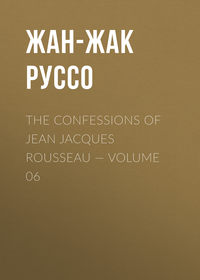 полная версия
полная версияПолная версия
The Confessions of Jean Jacques Rousseau — Complete
Duchense showed the letter. Diderot, upon whom it ought to have had an effect quite contrary, was vexed at it. His pride could not forgive me the superiority of a generous action, and I was informed his wife everywhere inveighed against me with a bitterness with which I was not in the least affected, as I knew she was known to everybody to be a noisy babbler.
Diderot in his turn found an avenger in the Abbe Morrellet, who wrote against Palissot a little work, imitated from the ‘Petit Prophete’, and entitled the Vision. In this production he very imprudently offended Madam de Robeck, whose friends got him sent to the Bastile; though she, not naturally vindictive, and at that time in a dying state, I am certain had nothing to do with the affair.
D’Alembert, who was very intimately connected with Morrellet, wrote me a letter, desiring I would beg of Madam de Luxembourg to solicit his liberty, promising her in return encomiums in the ‘Encyclopedie’; my answer to this letter was as follows:
“I did not wait the receipt of your letter before I expressed to Madam de Luxembourg the pain the confinement of the Abbe Morrellet gave me. She knows my concern, and shall be made acquainted with yours, and her knowing that the abbe is a man of merit will be sufficient to make her interest herself in his behalf. However, although she and the marechal honor me with a benevolence which is my greatest consolation, and that the name of your friend be to them a recommendation in favor of the Abbe Morrellet, I know not how far, on this occasion, it may be proper for them to employ the credit attached to the rank they hold, and the consideration due to their persons. I am not even convinced that the vengeance in question relates to the Princess Robeck so much as you seem to imagine; and were this even the case, we must not suppose that the pleasure of vengeance belongs to philosophers exclusively, and that when they choose to become women, women will become philosophers.
“I will communicate to you whatever Madam de Luxembourg may say to me after having shown her your letter. In the meantime, I think I know her well enough to assure you that, should she have the pleasure of contributing to the enlargement of the Abbe Morrellet, she will not accept the tribute of acknowledgment you promise her in the Encyclopedie, although she might think herself honored by it, because she does not do good in the expectation of praise, but from the dictates of her heart.”
I made every effort to excite the zeal and commiseration of Madam de Luxembourg in favor of the poor captive, and succeeded to my wishes. She went to Versailles on purpose to speak to M. de St. Florentin, and this journey shortened the residence at Montmorency, which the marechal was obliged to quit at the same time to go to Rouen, whither the king sent him as governor of Normandy, on account of the motions of the parliament, which government wished to keep within bounds. Madam de Luxembourg wrote me the following letter the day after her departure:
VERSAILLES, Wednesday.“M. de Luxembourg set off yesterday morning at six o’clock. I do not yet know that I shall follow him. I wait until he writes to me, as he is not yet certain of the stay it will be necessary for him to make. I have seen M. de St. Florentin, who is as favorably disposed as possible towards the Abbe Morrellet; but he finds some obstacles to his wishes which however, he is in hopes of removing the first time he has to do business with the king, which will be next week. I have also desired as a favor that he might not be exiled, because this was intended; he was to be sent to Nancy. This, sir, is what I have been able to obtain; but I promise you I will not let M. de St. Florentin rest until the affair is terminated in the manner you desire. Let me now express to you how sorry I am on account of my being obliged to leave you so soon, of which I flatter myself you have not the least doubt. I love you with all my heart, and shall do so for my whole life.”
A few days afterwards I received the following note from D’Alembert, which gave me real joy.
August 1st.“Thanks to your cares, my dear philosopher, the abbe has left the Bastile, and his imprisonment will have no other consequence. He is setting off for the country, and, as well as myself, returns you a thousand thanks and compliments. ‘Vale et me ama’.”
The abbe also wrote to me a few days afterwards a letter of thanks, which did not, in my opinion, seem to breathe a certain effusion of the heart, and in which he seemed in some measure to extenuate the service I had rendered him. Some time afterwards, I found that he and D’Alembert had, to a certain degree, I will not say supplanted, but succeeded me in the good graces of Madam de Luxembourg, and that I had lost in them all they had gained. However, I am far from suspecting the Abbe Morrellet of having contributed to my disgrace; I have too much esteem for him to harbor any such suspicion. With respect to D’Alembert, I shall at present leave him out of the question, and hereafter say of him what may seem necessary.
I had, at the same time, another affair which occasioned the last letter I wrote to Voltaire; a letter against which he vehemently exclaimed, as an abominable insult, although he never showed it to any person. I will here supply the want of that which he refused to do.
The Abbe Trublet, with whom I had a slight acquaintance, but whom I had but seldom seen, wrote to me on the 13th of June, 1760, informing me that M. Formey, his friend and correspondent, had printed in his journal my letter to Voltaire upon the disaster at Lisbon. The abbe wished to know how the letter came to be printed, and in his jesuitical manner, asked me my opinion, without giving me his own on the necessity of reprinting it. As I most sovereignly hate this kind of artifice and strategem, I returned such thanks as were proper, but in a manner so reserved as to make him feel it, although this did not prevent him from wheedling me in two or three other letters until he had gathered all he wished to know.
I clearly understood that, not withstanding all Trublet could say, Formey had not found the letter printed, and that the first impression of it came from himself. I knew him to be an impudent pilferer, who, without ceremony, made himself a revenue by the works of others. Although he had not yet had the incredible effrontery to take from a book already published the name of the author, to put his own in the place of it, and to sell the book for his own profit.
[In this manner he afterwards appropriated to himself Emilius.]
But by what means had this manuscript fallen into his hands? That was a question not easy to resolve, but by which I had the weakness to be embarrassed. Although Voltaire was excessively honored by the letter, as in fact, notwithstanding his rude proceedings, he would have had a right to complain had I had it printed without his consent, I resolved to write to him upon the subject. The second letter was as follows, to which he returned no answer, and giving greater scope to his brutality, he feigned to be irritated to fury.
MONTMORENCY, 17th June, 1760.“I did not think, sir, I should ever have occasion to correspond with you. But learning the letter I wrote to you in 1756 had been printed at Berlin, I owe you an account of my conduct in that respect, and will fulfil this duty with truth and simplicity.
“The letter having really been addressed to you was not intended to be printed. I communicated the contents of it, on certain conditions, to three persons, to whom the right of friendship did not permit me to refuse anything of the kind, and whom the same rights still less permitted to abuse my confidence by betraying their promise. These persons are Madam de Chenonceaux, daughter-in-law to Madam Dupin, the Comtesse d’Houdetot, and a German of the name of Grimm. Madam de Chenonceaux was desirous the letter should be printed, and asked my consent. I told her that depended upon yours. This was asked of you which you refused, and the matter dropped.
“However, the Abbe Trublet, with whom I have not the least connection, has just written to me from a motive of the most polite attention that having received the papers of the journal of M. Formey, he found in them this same letter with an advertisement, dated on the 23d of October, 1759, in which the editor states that he had a few weeks before found it in the shops of the booksellers of Berlin, and, as it is one of those loose sheets which shortly disappear, he thought proper to give it a place in his journal.
“This, sir, is all I know of the matter. It is certain the letter had not until lately been heard of at Paris. It is also as certain that the copy, either in manuscript or print, fallen into the hands of M. de Formey, could never have reached them except by your means (which is not probable) or of those of one of the three persons I have mentioned. Finally, it is well known the two ladies are incapable of such a perfidy. I cannot, in my retirement learn more relative to the affair. You have a correspondence by means of which you may, if you think it worth the trouble, go back to the source and verify the fact.
“In the same letter the Abbe Trublet informs me that he keeps the paper in reserve, and will not lend it without my consent, which most assuredly I will not give. But it is possible this copy may not be the only one in Paris. I wish, sir, the letter may not be printed there, and I will do all in my power to prevent this from happening; but if I cannot succeed, and that, timely perceiving it, I can have the preference, I will not then hesitate to have it immediately printed. This to me appears just and natural.
“With respect to your answer to the same letter, it has not been communicated to anyone, and you may be assured it shall not be printed without your consent, which I certainly shall not be indiscreet enough to ask of you, well knowing that what one man writes to another is not written to the public. But should you choose to write one you wish to have published, and address it to me, I promise you faithfully to add to it my letter and not to make to it a single word of reply.
“I love you not, sir; you have done me, your disciple and enthusiastic admirer; injuries which might have caused me the most exquisite pain. You have ruined Geneva, in return for the asylum it has afforded you; you have alienated from me my fellow-citizens, in return for eulogiums I made of you amongst them; it is you who render to me the residence of my own country insupportable; it is you who will oblige me to die in a foreign land, deprived of all the consolations usually administered to a dying person; and cause me, instead of receiving funeral rites, to be thrown to the dogs, whilst all the honors a man can expect will accompany you in my country. Finally I hate you because you have been desirous I should; but I hate you as a man more worthy of loving you had you chosen it. Of all the sentiments with which my heart was penetrated for you, admiration, which cannot be refused your fine genius, and a partiality to your writings, are those you have not effaced. If I can honor nothing in you except your talents, the fault is not mine. I shall never be wanting in the respect due to them, nor in that which this respect requires.”
In the midst of these little literary cavillings, which still fortified my resolution, I received the greatest honor letters ever acquired me, and of which I was the most sensible, in the two visits the Prince of Conti deigned to make to me, one at the Little Castle and the other at Mont Louis. He chose the time for both of these when M. de Luxembourg was not at Montmorency, in order to render it more manifest that he came there solely on my account. I have never had a doubt of my owing the first condescensions of this prince to Madam de Luxembourg and Madam de Boufflers; but I am of opinion I owe to his own sentiments and to myself those with which he has since that time continually honored me.
[Remark the perseverance of this blind and stupid confidence in the midst of all the treatment which should soonest have undeceived me.
It continued until my return to Paris in 1770.]
My apartments at Mont Louis being small, and the situation of the alcove charming, I conducted the prince to it, where, to complete the condescension he was pleased to show me, he chose I should have the honor of playing with him a game of chess. I knew he beat the Chevalier de Lorenzy, who played better than I did. However, notwithstanding the signs and grimace of the chevalier and the spectators, which I feigned not to see, I won the two games we played: When they were ended, I said to him in a respectful but very grave manner: “My lord, I honor your serene highness too much not to beat you always at chess.” This great prince, who had real wit, sense, and knowledge, and so was worthy not to be treated with mean adulation, felt in fact, at least I think so, that I was the only person present who treated him like a man, and I have every reason to believe he was not displeased with me for it.
Had this even been the case, I should not have reproached myself with having been unwilling to deceive him in anything, and I certainly cannot do it with having in my heart made an ill return for his goodness, but solely with having sometimes done it with an ill grace, whilst he himself accompanied with infinite gracefulness the manner in which he showed me the marks of it. A few days afterwards he ordered a hamper of game to be sent me, which I received as I ought. This in a little time was succeeded by another, and one of his gamekeepers wrote me, by order of his highness, that the game it contained had been shot by the prince himself. I received this second hamper, but I wrote to Madam de Boufflers that I would not receive a third. This letter was generally blamed, and deservedly so. Refusing to accept presents of game from a prince of the blood, who moreover sends it in so polite a manner, is less the delicacy of a haughty man, who wishes to preserve his independence, than the rusticity of a clown, who does not know himself. I have never read this letter in my collection without blushing and reproaching myself for having written it. But I have not undertaken my Confession with an intention of concealing my faults, and that of which I have just spoken is too shocking in my own eyes to suffer me to pass it over in silence.
If I were not guilty of the offence of becoming his rival I was very near doing it; for Madam de Boufflers was still his mistress, and I knew nothing of the matter. She came rather frequently to see me with the Chevalier de Lorenzy. She was yet young and beautiful, affected to be whimsical, and my mind was always romantic, which was much of the same nature. I was near being laid hold of; I believe she perceived it; the chevalier saw it also, at least he spoke to me upon the subject, and in a manner not discouraging. But I was this time reasonable, and at the age of fifty it was time I should be so. Full of the doctrine I had just preached to graybeards in my letter to D’Alembert, I should have been ashamed of not profiting by it myself; besides, coming to the knowledge of that of which I had been ignorant, I must have been mad to have carried my pretensions so far as to expose myself to such an illustrious rivalry. Finally, ill cured perhaps of my passion for Madam de Houdetot, I felt nothing could replace it in my heart, and I bade adieu to love for the rest of my life. I have this moment just withstood the dangerous allurements of a young woman who had her views; and if she feigned to forget my twelve lustres I remember them. After having thus withdrawn myself from danger, I am no longer afraid of a fall, and I answer for myself for the rest of my days.
Madam de Boufflers, perceiving the emotion she caused in me, might also observe I had triumphed over it. I am neither mad nor vain enough to believe I was at my age capable of inspiring her with the same feelings; but, from certain words which she let drop to Theresa, I thought I had inspired her with a curiosity; if this be the case, and that she has not forgiven me the disappointment she met with, it must be confessed I was born to be the victim of my weaknesses, since triumphant love was so prejudicial to me, and love triumphed over not less so.
Here finishes the collection of letters which has served me as a guide in the last two books. My steps will in future be directed by memory only; but this is of such a nature, relative to the period to which I am now come, and the strong impression of objects has remained so perfectly upon my mind, that lost in the immense sea of my misfortunes, I cannot forget the detail of my first shipwreck, although the consequences present to me but a confused remembrance. I therefore shall be able to proceed in the succeeding book with sufficient confidence. If I go further it will be groping in the dark.
BOOK XI
Although Eloisa, which for a long time had been in the press, did not yet, at the end of the year, 1760, appear, the work already began to make a great noise. Madam de Luxembourg had spoken of it at court, and Madam de Houdetot at Paris. The latter had obtained from me permission for Saint Lambert to read the manuscript to the King of Poland, who had been delighted with it. Duclos, to whom I had also given the perusal of the work, had spoken of it at the academy. All Paris was impatient to see the novel; the booksellers of the Rue Saint Jacques, and that of the Palais Royal, were beset with people who came to inquire when it was to be published. It was at length brought out, and the success it had, answered, contrary to custom, to the impatience with which it had been expected. The dauphiness, who was one of the first who read it, spoke of it to M. de Luxembourg as a ravishing performance. The opinions of men of letters differed from each other, but in those of any other class approbation was general, especially with the women, who became so intoxicated with the book and the author, that there was not one in high life with whom I might not have succeeded had I undertaken to do it. Of this I have such proofs as I will not commit to paper, and which without the aid of experience, authorized my opinion. It is singular that the book should have succeeded better in France than in the rest of Europe, although the French, both men and women, are severely treated in it. Contrary to my expectation it was least successful in Switzerland, and most so in Paris. Do friendship, love and virtue reign in this capital more than elsewhere? Certainly not; but there reigns in it an exquisite sensibility which transports the heart to their image, and makes us cherish in others the pure, tender and virtuous sentiments we no longer possess. Corruption is everywhere the same; virtue and morality no longer exist in Europe; but if the least love of them still remains, it is in Paris that this will be found.—[I wrote this in 1769.]
In the midst of so many prejudices and feigned passions, the real sentiments of nature are not to be distinguished from others, unless we well know to analyze the human heart. A very nice discrimination, not to be acquired except by the education of the world, is necessary to feel the finesses of the heart, if I dare use the expression, with which this work abounds. I do not hesitate to place the fourth part of it upon an equality with the Princess of Cleves; nor to assert that had these two works been read nowhere but in the provinces, their merit would never have been discovered. It must not, therefore, be considered as a matter of astonishment, that the greatest success of my work was at court. It abounds with lively but veiled touches of the pencil, which could not but give pleasure there, because the persons who frequent it are more accustomed than others to discover them. A distinction must, however, be made. The work is by no means proper for the species of men of wit who have nothing but cunning, who possess no other kind of discernment than that which penetrates evil, and see nothing where good only is to be found. If, for instance, Eloisa had been published in a certain country, I am convinced it would not have been read through by a single person, and the work would have been stifled in its birth.
I have collected most of the letters written to me on the subject of this publication, and deposited them, tied up together, in the hands of Madam de Nadillac. Should this collection ever be given to the world, very singular things will be seen, and an opposition of opinion, which shows what it is to have to do with the public. The thing least kept in view, and which will ever distinguish it from every other work, is the simplicity of the subject and the continuation of the interest, which, confined to three persons, is kept up throughout six volumes, without episode, romantic adventure, or anything malicious either in the persons or actions. Diderot complimented Richardson on the prodigious variety of his portraits and the multiplicity of his persons. In fact, Richardson has the merit of having well characterized them all; but with respect to their number, he has that in common with the most insipid writers of novels who attempt to make up for the sterility of their ideas by multiplying persons and adventures. It is easy to awaken the attention by incessantly presenting unheard of adventures and new faces, which pass before the imagination as the figures in a magic lanthorn do before the eye; but to keep up that attention to the same objects, and without the aid of the wonderful, is certainly more difficult; and if, everything else being equal, the simplicity of the subject adds to the beauty of the work, the novels of Richardson, superior in so many other respects, cannot in this be compared to mine. I know it is already forgotten, and the cause of its being so; but it will be taken up again. All my fear was that, by an extreme simplicity, the narrative would be fatiguing, and that it was not sufficiently interesting to engage the attention throughout the whole. I was relieved from this apprehension by a circumstance which alone was more flattering to my pride than all the compliments made me upon the work.
It appeared at the beginning of the carnival; a hawker carried it to the Princess of Talmont—[It was not the princess, but some other lady, whose name I do not know.]—on the evening of a ball night at the opera. After supper the Princess dressed herself for the ball, and until the hour of going there, took up the new novel. At midnight she ordered the horses to be put into the carriage, and continued to read. The servant returned to tell her the horses were put to; she made no answer. Her people perceiving she forgot herself, came to tell her it was two o’clock. “There is yet no hurry,” replied the princess, still reading on. Some time afterwards, her watch having stopped, she rang to know the hour. She was told it was four o’clock. “That being the case,” she said, “it is too late to go to the ball; let the horses be taken off.” She undressed herself and passed the rest of the night in reading.
Ever since I came to the knowledge of this circumstance, I have had a constant desire to see the lady, not only to know from herself whether or not what I have related be exactly true, but because I have always thought it impossible to be interested in so lively a manner in the happiness of Julia, without having that sixth and moral sense with which so few hearts are endowed, and without which no person whatever can understand the sentiments of mine.
What rendered the women so favorable to me was, their being persuaded that I had written my own history, and was myself the hero of the romance. This opinion was so firmly established, that Madam de Polignac wrote to Madam de Verdelin, begging she would prevail upon me to show her the portrait of Julia. Everybody thought it was impossible so strongly to express sentiments without having felt them, or thus to describe the transports of love, unless immediately from the feelings of the heart. This was true, and I certainly wrote the novel during the time my imagination was inflamed to ecstasy; but they who thought real objects necessary to this effect were deceived, and far from conceiving to what a degree I can at will produce it for imaginary beings. Without Madam d’Houdetot, and the recollection of a few circumstances in my youth, the amours I have felt and described would have been with fairy nymphs. I was unwilling either to confirm or destroy an error which was advantageous to me. The reader may see in the preface a dialogue, which I had printed separately, in what manner I left the public in suspense. Rigorous people say, I ought to have explicity declared the truth. For my part I see no reason for this, nor anything that could oblige me to it, and am of opinion there would have been more folly than candor in the declaration without necessity.











